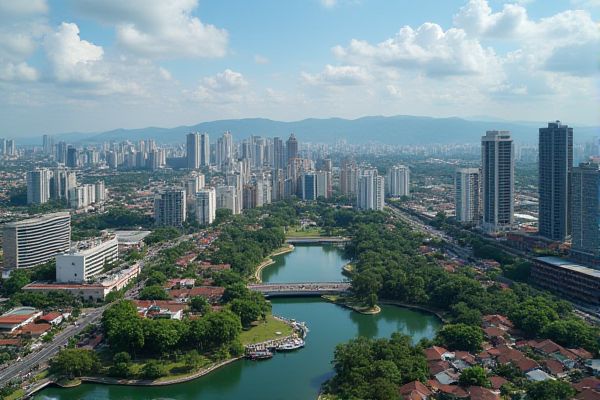
Local laws and regulations in Indonesia: Immigration and visa requirements. Taxation system and obligations. Business licensing procedures. Labor laws and workers' rights. Property ownership restrictions. Consumer protection laws. Environmental regulations. Data privacy and protection. Traffic and transportation laws. Import and export regulations.
Immigration and visa requirements.
In Indonesia, immigration and visa requirements are strictly enforced, with various visa types, such as Visit Visa and Limited-Stay Visa, requiring a sponsor, specific documentation, and application through designated portals or Indonesian missions abroad. These documents include a passport with at least six months validity, return or onward tickets, and bank account copies. Extensions and specific requirements vary by visa type, and violations can result in detention, fines, and deportation. For more detailed information, you can visit the General Visa Application page on the Indonesian Embassy's website.
Taxation system and obligations.
In Indonesia, the taxation system is based on residency, with residents taxed on their worldwide income. Individual taxpayers must file monthly and annual tax returns, with monthly payments due by the 15th of the following month and annual returns due by the end of the third month after the calendar year end. Tax liabilities are paid through designated tax-payment banks, and late payments incur interest penalties and administrative fines. For more detailed information, refer to the Tax Administration guidelines provided by PwC.
Business licensing procedures.
In Indonesia, business licenses are governed by Regulation 24/2018, mandating the use of the Online Single Submission (OSS) system for obtaining licenses such as the Business Identification Number (NIB), commercial, and operational licenses. The process involves submitting required documentation, including the company's domicile, ID cards, and other certificates. Licenses are typically issued within 14 working days. For more detailed information on acquiring business licenses, you can visit the Paul Hype Page website.
Labor laws and workers' rights.
Indonesia's labor laws, primarily governed by the Manpower Law (Law No. 13 of 2003), ensure various workers' rights including minimum wage, working hours limited to 40 hours a week, overtime pay, annual leave, and the right to form and join labor unions. The laws also protect against discrimination, mandate safe working conditions, and provide for dispute resolution through mediation, arbitration, and court proceedings. For a deeper understanding of these regulations, you can visit the Indonesia Employment Law blog, offering insightful information about the country's employment standards and legal framework.
Property ownership restrictions.
Foreigners in Indonesia are restricted from direct land ownership and can only acquire property through leasehold agreements, typically for 30 years with a possible 30-year extension. They are limited to owning certain types of properties like apartments or condominiums, with specific conditions and criteria to be met. For a comprehensive understanding of these laws, you may refer to the Understanding Property Ownership Laws in Indonesia which provides detailed guidance specifically tailored for foreign investors.
Consumer protection laws.
In Indonesia, consumer protection is primarily governed by Law No. 8 of 1999 on Consumer Protection, which aims to safeguard the rights of consumers and promote their resources. The law details consumer and entrepreneur rights and obligations, prohibits certain clauses in contracts, and establishes the national consumer protection agency and dispute settlement bodies, with additional strategies outlined in the National Strategy on Consumer Protection as per Presidential Decree Number 50 of 2017.
Environmental regulations.
Indonesia's environmental regulations are pivotal in advancing ecological sustainability, with the Ministerial Regulation Number P.16 / MENLHK / SETJEN / KUM.1 / 2/2017 serving as a cornerstone. This regulation provides technical guidelines for the restoration of peatland ecosystem functions, placing significant emphasis on biodiversity conservation, water management, and carbon storage. It necessitates that businesses revise their spatial and business plans while acquiring revised environmental permits to conform to these guidelines. Additionally, the Environmental Law of 2009 mandates sustainable influence analyses for enterprises with notable environmental impacts, incorporating provisions for environmental impact assessments, sanctions for violations, and the regulation of harmful substances. In a bid to enhance international cooperation, the Indonesian Ministry of Environment and Forestry has signed a Memorandum of Understanding with the U.S. EPA, focusing on climate change, air and water quality management, waste management, and the enforcement of environmental laws. This collaboration underscores Indonesia's commitment to tackling global environmental challenges and protecting its natural resources for future generations.
Data privacy and protection.
Indonesia's Personal Data Protection (PDP) Law, enacted on October 17, 2022, is the country's first comprehensive law governing personal data protection in both electronic and non-electronic systems. It requires organizations to identify a legal basis for data processing, implement robust data security measures, and comply with regulations on data collection, storage, processing, and transfer. With a transition period, entities are expected to achieve full compliance by October 2024. For more details, the official overview can be found on the Thales Group Website.
Traffic and transportation laws.
In Indonesia, drivers must follow strict regulations, including driving on the left-hand side, carrying a valid SIM or international driving license, wearing seat belts in front seats, and adhering to speed limits for urban, rural, and motorway areas. There is zero tolerance for drunk driving, and drivers are prohibited from using mobile phones while behind the wheel. Vehicles must be equipped with essential safety and maintenance gear, such as safety belts, emergency triangles, and fire extinguishers. For more detailed information on these rules, you can visit the comprehensive guide on Angloinfo about driving regulations in Indonesia.
Import and export regulations.
In Indonesia, import and export regulations are governed by various laws and regulations, including the Omnibus Law and its implementing regulations. Businesses must obtain a Business Identification Number (NIB) and may need additional licenses depending on the goods, with customs duties and taxes determined by the Harmonized System (HS) code. Prohibited goods include items like finished hand tools, sugar, ozone-depleting substances, and certain drugs, with specific requirements for customs clearance, documentation, and licensing. For more insights and best practices, [ASEAN Briefing](https://www.aseanbriefing.com/news/import-export-procedures-indonesia-best-practices/) provides comprehensive guidance on import and export procedures in this region.
